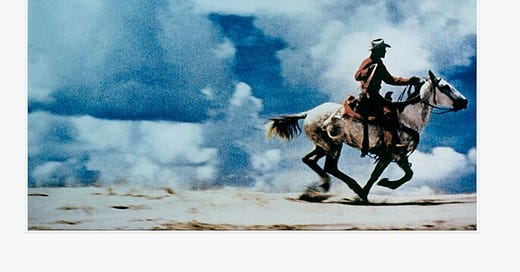Despite years of trying in my youth, I never warmed to poetry. This shifted last year after I stumbled across a Haiku by the Japanese master Kobayashi Issa. There are several translations of the original Japanese, but this is my favorite:
The world of dew
is the world of dew.
And yet …
And yet …
Something shifted inside me on the first read. Its simplicity was so stark, and its meaning so universal that it almost brought me to tears. I shared the poem with my wife, but she didn’t have nearly the same reaction. Nevertheless, as I spent more time with the poem, its power continued to stir something profound within. It made me reflect on the contained nature of our existence juxtaposed with the seemingly inexplicable vastness surrounding us. What is it about these words that bring such comfort?
Months after encountering Issa’s work, Devendra Banhart released a new album called Flying Wig. My anticipation was palpable, for Banhart's music has consistently woven its way through my life. However, diving into a new album from a beloved artist always carries a touch of unease. The unfamiliar tunes can initially seem unpolished and rough around the edges. Before too long, they assimilate into some aspect of your existence and take on a new complexion that reflects an element of personal history. The music becomes yours.
Banhart’s new album landed softly despite it marking a departure from his early freak folk style. This album has a synth current intricately woven with lyrics that delve into longing and the search for stability. “I'm looking for a kindness, I know is there,” the opening track, “Feeling”, softly pronounces. “Trying to show me, it's everywhere/ And when the night comes; oh, how she comes.”
It was no surprise to me when I discovered that the record drew inspiration from the very Issa poem that resonated so profoundly with me. These types of synchronicities point to deeper truths. I’m not sure what those truths are, but these two pieces of art feel like friends on this journey. I turn to them for the calm I crave. I leave you with another of my favorite Issa poems that touches on another of my enduring allies: the ocean.
Mother I never knew
every time I see the ocean
every time
More Music
Dave Matthews played in Cape Town last week. Milling about the crowd, it was a nice confirmation of being middle-aged. But that’s not what this section is about. The opening act – the Thanda Choir – was out of this world. The choir is made up of young people from Khayelitsha, one of the largest townships in South Africa. Their music resonated with a power that defies description. This cover of Brenda Fassie's timeless classic "Too Late for Mama" is a glimpse of that power. The music starts around the five-minute mark.
Publishing
We have lost control of artificial intelligence. This shouldn’t be surprising, considering we never had any control over it. The maelstrom at OpenAI over the abrupt dismissal of its chief executive, Sam Altman, raised accountability questions inside one of the world’s most powerful AI companies. Yet even before the boardroom drama, our understanding of how AI is created and used was limited. To read more about this dismal situation, check out my piece from last week.
And finally
I borrowed the headline of this edition from an epigraph Robert Hass used to open his book Praise. Here’s the whole thing:
We asked the captain what course
of action he proposed to take toward
a beast so large, terrifying, and
unpredictable. He hesitated to
answer, and then said judiciously:
'I think I shall praise it.’
Here’s to praising the beasts in your life. Until the next edition.




